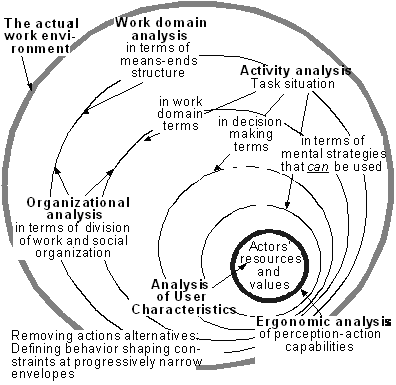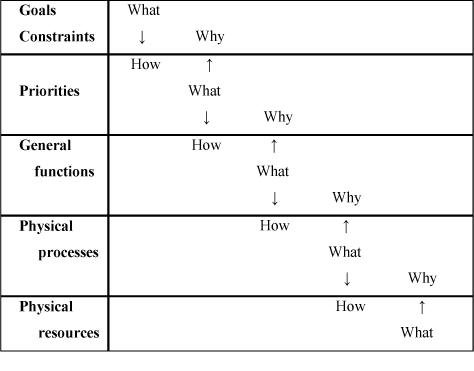Table of Contents
The cognitive work analysis framework (Fidel & Pejtersen, 2004)
認知工作分析架構:從資訊行為研究到資訊系統設計
Citation - Fidel, R., & Pejtersen, A. M. (2004). From information behaviour research to the design of information systems: The cognitive work analysis framework. Information Research, 10(1), 10-11.
Keyword - Cognitive work analysis, Information behavior
Source - http://informationr.net/ir/10-1/paper210.html
本文可分為四段:
- 第一段簡介 CWA,其分析面向,與其特徵。Fidel & Pejtersen, 2005一文主要使用此段內容。
- 第二段,以手段-目的分析為例,說明 CWA 如何處理情境的複雜性。
- 第三段,說明描述性研究與分析性研究的不同,並強調 CWA 可以兼顧兩者。
- 第四段,說明應用 CWA 的問題。
Cognitive Work Analysis
Cognitive Work Analysis: 認知工作分析
- Vicente(1999):由 Rasmussen 等人(1994)所發展的一種工作中心概念架構。其目的是為了分析認知性工作。此架構的理論基礎來自於:系統化思維(general system thinking)、適應控制系統(adaptive control systems)、Gibson的環境心理學(Ecological Psychology);以及各種不同工作領域中支援系統開發的實地研究。從1960年代至今,統稱為認知系統工程(cognitive systems engineering)。
- Woods (2003)認為,這個學派的基本想法是,'adaptations directed at coping with complexity… and how to make automated and intelligent systems team players'. / 調適性主導對複雜性的處理,與如何產生自動化與智能系統團隊角色。
資訊科學與認知工作分析:
- 將 cognitive work analysis 應用在資訊科學中,研究者能夠分析設計資訊系統的認知性作業。在此,「資訊系統」此一概念指任何一種系統,不論是心智的或是電腦的。此「資訊系統」能促進並協助人資互動。因此,一座圖書館整體而言可以被視為是一個資訊系統;參考服務櫃檯,網際網路,OPAC(線上公共編目),編目部門,也都能被視為是一個資訊系統。
認知工作分析取向的設計與一般資訊系統設計的不同:
- 與一般資訊系統的設計方法不同(先進行設計與開發,再進行系統評估),認知工作分析是先進行實地的系統評估,然後發展系統設計建議。
- 此一系統評估是根據情境中資訊行為的分析。認知工作分析已經成功的被應用在資訊系統與協同工作的評估與設計。
- 例如,認知工作分析發展出第一個空想「BookHouse」檢索系統(Pejtersen 1989; Rasmussen et al., 1994; Pejtersen, 1992)。根據對公共圖書館與學校圖書館參考晤談的分析,Pejtersen 發展了一個有圖形介面的空想檢索系統,在此系統中,使用者可以根據各種屬性,如主題、歷史、心情、封面設計等等檢視書本。這個系統能為成人與孩童所使用,也能符合圖書館編目員的需求。此一系統也cater許多策略:使用者可以不需要先設想任何特定的屬性,便可以直接瀏覽,也可以尋找特定書籍,或檢索與她們喜歡的相似的書籍。
- 最近,認知工作分析被用來分析在一項高中學生網路搜尋研究的資料(Pejtersen & Fidel, 1998; Fidel et al., 1999)。這個研究中,認知工作研究的架構,在涵蓋學生在網路搜尋遇過的難題上提供有力協助,並提供解決這類問題的建議。Pejtersen 與她的同儕最近完成了一個 COLLATE 專案計畫, 研究德國、瑞士、奧地利電影資料館間索引與檢索跨國跨機構協同的問題。
The dimensions of Cognitive Work Analysis
- CWA 認為,在與工作相關的活動中進行資訊互動的人,是一「行動者/演員(actor)」,而非一般資訊系統所稱的「使用者(user)」。CWA 專注於工作中的資訊行為,研究人類工作活動情境中的人資互動。認知工作分析專注於職場上的資訊行為,從人類工作活動的情境探討人與資訊的互動。
- 認知工作分析假定為了能夠設計出能與人類和諧工作的系統,必須先了解:
- 行動者所作的工作 / the work actors do,
- 他們的資訊行為 / their information behaviour,
- 工作所處的情境 / the context in which they work, and
- 其行動的理由 / the reasons for their actions
- 因此,CWA 同時探究行動者的工作表現,運作的環境,與人進行任務時的知覺、認知、人因工程學的屬性。
- 下圖表現出認知工作分析的架構。前文所提的研究屬性都指涉到相應的圓型上,每一個圓形都表示一種分析的面向。因此每個面向,根據研究的目的與其方法,都包含了許多的屬性、因素、或是變數。
- 因為認知工作分析探究情境中的資訊行為,更勝於對一般性資訊系統的設計上,個別研究所產生的結果也能對相同情境的資訊系統具有效度。
- 然而,由各種研究的結果加以結合概化以形成其他資訊系統的設計。
以分析一個公立小學教師的研究計劃,發展一協助教師的資訊系統為例,其認知工作分析面向應該如:
- 工作環境 / The work environment - 探究學校內運作的環境。範例問題:學校在那個行政層級的規章下運作?政府對課程規劃的政策與標準為何?學校新生入學的人口分布?
- 工作領域分析 / Work-domain analysis 研究在學校與學校圖書館內完成的工作。範例問題:各個組織設立的目標為何?在執行時有受到何種限制?各個組織會參與何種活動?為完成此種活動,會使用到何種工具或技術?
- 任務分析 / Task analysis 檢視特定任務並以相同問題分析這些特定任務。範例問題:教師這堂課的目的為何?教師在備課與授課中面臨到何種限制?教師會諮詢那種資訊資源?
- 組織分析 / Organizational analysis 檢按管理風格、組織文化、習俗、與角色如何分派。範例問題:教師如何與校長溝通?教師被指派教導此堂課的原因?誰決定要或不要在課程中安排圖書館員介紹的時段?這些程序依循的常規為何?
- 決策分析 / Decision analysis 提供一個更具體的個別決策分析。範例問題:哪些圖與某一課程相關?學校圖書館員需要哪些資訊來作出此一決策?可以取得哪些資訊來源?有哪些來源是想要但是無法取得的?
- 策略分析 / Strategies analysis 對每一個任務與策略,檢視哪一種策略是可能的。範例問題:一個為了課程教學尋找圖檔的老師,如何找到所需的圖檔?是問同事?還是到圖書館借書?到網路上找?他能找藝術資料庫嗎?
- 使用者資源與價值分析 / User's resources and values analysis 辨識出每個使用者族群的特徵。範例問題:教師在搜尋視覺資訊時的經驗為何?教師所需的藝術必備標準的知識為何?老師最重要的核心價值為何?學校圖書館員應具有藝術課程的重要程度為何?
- 運用面向的順序: 儘管透過一定的順序介紹這些面向的內涵,但是在實際的研究計劃中,認知工作分析並不要求有一個固定的順序進行。因為這些面向的相依性,研究者會反覆地從一個面向探討到另一個面向。這種面向間移動的途徑,視個別的研究課題,與實務研究考量而定。
- From the perspective of information seeking, one may interpret Figure 1 in a distinct way. Suppose one wishes to analyse information seeking behaviour of a group of people (rather than design an information system). Information seeking behaviour manifests itself by the strategies that people employ (see Figure 1), that is, the methods they use to find information. Clearly, a host of factors external to the behaviour itself influence the selection of strategies. In the systems approach terminology, such factors are called constraints, factors that affect information behaviour, but cannot be changed by it (Churchman, 1979).
- 認知工作分析與資訊搜尋行為研究:
- 認知工作分析的面向能呈現出資訊搜尋中的行為制約(constraint);這些制約由工作場地的外在環境開始,到個人資源與角色價值。認知工作分析的每一分析面向,都能分析出面向內的制約因素。
- 因此,工作環境影響工作場地如何運作,且這種運作模式形塑出角色所進行的工作任務。
- 同時,工作任務(task)影響角色作出決策,這些決策又進一步影響搜尋行為。
- 另外,角色的個人特質(characteristics)也影響搜尋行為,一如社會組織對工作場所的影響。
- 認知工作分析假定,儘管可以不考慮這些制約限制直接描述資訊行為,最好的資訊行為研究方法仍應是透過對這些制約限制的深入分析。
- 因而,可以說認知工作分析是透過對制約限制的分析,來刻劃出資訊搜尋行為。
Some characteristics of Cognitive Work Analysis
- [定義情境]在某種程度上,認知工作分析面向定義了資訊搜尋的情境,並且提供一分析架構。
- Johnson 認為認知工作分析只注重制約與限制,忽略了個人的能力(Johnson 2003: 738)
- 作者對此的回應
- 認知工作分析的焦點在於分析特定情境中的制約,即,影響工作與資訊行為的因素。
- 認知工作分析研究,指證與研究給定情境的制約限制的工作,假定每一情境具有各自的制約限制。
- [資訊系統設計工具]認知工作分析有一些不同的屬性,指證這些屬性能有助於人資互動研究與資訊系統設計。
- 最重要的,認知工作分析提供一整體研究取向,能同時研究數個面向。
- 另外,認知工作分析架構也能促成一情境中多種面向的深度檢驗。
- 因此,一項針對特定情境的研究是一理解在工作情境中的人於資訊互動的多元學科檢驗。
- 這兩項屬性使認知工作分析架構成為一評估與設計資訊系統的有力指引。
- [研究架構]雖然認知工作分析架構基於一些概念與認識論的理論,最近認知工作分析也提供人資互動研究分析的理論結構,而非作為一特定理論或模型。
- Sanderson 對此提出解釋的看法: 'The scientific foundations of Cognitive Work Analysis are various—a “conceptual marketplace” as Rasmussen described it“because they have been appropriated to fulfil a practical need' (Sanderson 2003: 226)
- 可以利用多種對分析特定情境有用的理論、模型、或工具。
- 這種彈性能使研究焦點轉移到研究的現象本身,而非測試或證明模型或理論,或是完成特定的方法論。
- 同時,認知工作分析內建有能完成嚴謹與系統性研究的機制。它提供了數個分析與塑模的樣版,與分析的面向。其中一種樣版,「手段-目的分析」(Means-Ends Analysis),會在本文稍後討論。
Dealing with complexity
人資互動是一個複雜現象,因為人類認知程序本身既有的易變性,並生處在此一高度複雜的現代世界環境中。認知工作分析面向(上圖)只是處理這個複雜現象的第一步,先將複雜現象作一區隔。認知工作分析劃分出各個面向,指出有些屬性是組織的,有些是由工作或主題領域決定的,有些是文化或個人的。然而,每一個面向仍舊複雜。這些複雜現象如何能順從設計程序的需求?
Individual complexity and variability
- 原則上,所有角色(actor)可能的特徵,與生活經驗中的每個元素,都會影響其資訊行為。
- 巨大的可能性使人類資訊行為元素仍然未能被完全發現。(Fidel et al., in press)
- 因為元素的數量眾多,無法在一個研究或一個資訊系統的設計中,完整考慮每一種元素與所有元素可能的組合。
- 認知工作分析假定:資訊系統設計無法考慮到個體所有可能屬性、個體間的變異性、與在個人情境改變時所可能的轉變。因此,認知工作分析採取了「以工作為中心的研究取向」,而非「以使用者為中心的研究取向」。認知工作分析的核心在於工作領域與呈現在其中的需求,而非個別的角色。
This approach is facilitated by the Cognitive Work Analysis dimensions. Work analysis along these dimensions lays out the constraints under which actors carry out their tasks, regardless of their individual attributes. In other words, it analyses the context in which actors in a certain organization, performing a particular task, operate. Moreover, Cognitive Work Analysis recognizes that there are certain attributes that are typical to those who operate in a certain context. When Cognitive Work Analysis analyses actor's resources and values (inner circle in Figure 1), it creates a model of the prototypical actor, that is, that of the best example of an actor in the given context. Cognitive Work Analysis recognizes that not all actors are prototypical, and that their individual attributes and histories might affect their interaction with information. However, because the goal of Cognitive Work Analysis is to design information systems for distinct work domains and tasks, regardless of the individuals who are carrying out a task at a certain point in time, it considers the prototypical attributes as most important.
認知工作分析對各個面向的區分有助於此一研究取向的進行。工作分析援用這些面向,鋪陳出角色完成其任務時所面對的限制,而省略對個人屬性的分析。
The decision as to which prototypical attributes to analyse may change from one work domain to another. In a study about Web searching behaviour of high school students (Fidel et al., 1999), for example, we analysed the students' education, their experience with computers and with retrieving information from the Web, their experience in the subject domain, their educational plans for the future, their preferences with regard to searching the Web, the priority criteria they used to select a search strategy, the performance criteria they employed, and their opinion about their own situation, abilities, and preferences. While varying from one domain to another, several attributes are common to most domains, such as level of expertise and experience with the subject domain, experience and expertise with information systems, and technology, preferences, values, structure of subject domain, and type of training required to carry out the task. Future research on the application of Cognitive Work Analysis to the design of information systems is likely to develop a core set of attributes that would be relevant to most studies.
Complexity in the environment
- 不變量
- 分析人資互動發生的環境是困難的,因為難以決定何者需要分析,而何者排除在分析之外。
- 認知工作分析假定在這此一豐富與錯綜性中有「日常規律性的基本來源在於工作領域對人類行動的回應(basic sources of regularity that underlie the responses of the work domain to human actions)」 (Vicente, 1999: 47)
- 因此,工作分析聚焦於那些「日常規律性的基本來源」上,而這些基本來源即是形塑出角色行為的制約限制。
- 這些穩定的行為形塑限制被稱為「不變量(invariants)」。
- 專注於不變量的分析並不表示要忽略、或是減低環境的複雜性,因為不變量也能有高度的複雜性。
- 不變量只是將焦點放在環境中對資訊行為有顯著效果的元素。
- 環境變動時的系統設計概念
- 不變量的概念也轉變了資訊系統設計。
- 系統被設計來在不變量的領域中適應角色的工作。同時,認知工作分析辨識出影響資訊行為的情境因素與個別因素。
- 但是設計者不能預測系統中所有角色工作的可能方法。即,沒有一個被設計的系統能完全的適合所有情境因素與個別因素。
- 因此,當情境脫離了不變項的預測,角色將必須自我調適以符合該系統。即,角色必須能妥善的調適其行為。
- 然而,建造能讓角色適應系統行為的系統,這是設計者的任務。即,目的是設計一適合角色的固定領域工作、形塑行為制約限制、與同時當情境改變時能夠使角色自我調適的資訊系統。
- 手段-目的分析:分析情境內含之複雜性的工具,是一概念階層結構(abstraction hierarchy)的手段-目的分析(Means-Ends Analysis)樣版。
- 由上而下的分析:
- 這種分析由最抽象的階層開始分析:系統的目標與制約(圖2)。
- 透過對系統運作時優先性的檢驗,回答系統如何能達成其目的,即,用何種手段以達成目的。
- 研究者可以透過對系統一般性功能(general function)的掌握,了解系統如何執行其優先性考量。
- 經由執行某些程序(process),了解如何完成系統的一般功能。
- 最後,了解需要使用到那些資源(resources)以完成這些程序。
- 由下而上的分析:
- 如果,先檢視最具體層次的有形資源,則分析的程序是透過「為何」的問題,向上追問,以指證出手段-目的分析中所要找出的目的(end)。
- 學校教師的範例,略
- 手段-目的分析適合分析複雜性:
- 手段-目的分析能保存複雜性,並同時分析系統。
- 能保存複雜性的原因是,每一個層次都提供了一不同對系統的描述,且整合為一整體的分析,而非將其分解為不同的部分。
- 另外,手段-目的分析也具有妥善處理複雜性的良好機制,因為每一個上層都提供了下層分析所需的情境資訊。即,反映了一層的制約如何影響其下層。
- 此一樣版能用在對工作領域的分析上,也能用在任務或是決策的分析上。
Description versus analysis
- 專注於行為形塑制約的分析,而非對行為的觀察,使認知工作分析對於設計資訊系統特別有用。
- 僅只有對可觀察行為的描述,對設計者有許多問題。
- 人類的資訊行為是由其對周圍的資訊世界的心智模式所形成的,但是有許多模式是不完整,或是錯誤的。系統設計不應該由這些模式所主導。此外,並非所有人都具有相同的心智模式,但是設計者也無法知道何者是完整且正確的。
- 另外,資訊系統本來就已經在那邊了,其系統本來的有限性,已經影響其使用者的心智模式與其資訊行為。
- 然而,一般而論,設計者試著創造一個新的系統,或是改善系統,而非反映既有的系統。
- 相反的,藉由對形塑資訊行為的因素的了解,研究者可以決定哪些資訊行為模式可能發生,或是那種策略可能被使用,而與如何觀察現有的系統行為無關。這使得設計工作能由現有系統的能力與效能的限制中解放。
- 透過對目標與形塑行為制約的分析,可以得出一形成式模型(a formative model)。Vicente對形成性模式的說明是:「一種描述必須被滿足之需求的模型,使系統能以新穎、期望的方式運作。A model that describes requirements that must be satisfied so that a system could behave in a new, desired way」 (Vicente 1999: 7)
- 描述式模型定義、規範、解釋說明一切事物;而形成式模型只描繪其可能性。
- 地圖提供旅館遊客一些相關的限制:街道的分布、建築物、每條街可行的方向、距離,等等。對制約的分析可能製作出系統設計的地圖。資訊系統的設計者需要知道資訊行為的地貌。因此,人類資訊行為的研究能夠發現使用者的需求,使用者可能的做法,使用者不可能的做法;這將會是對系統設計最有用的貢獻。
Challenges to the application of Cognitive Work Analysis
- 因為彈性,認知工作分析並未提供任何做法的規定。
- 儘管其他研究架構通常告誡研究者應該使用什麼研究方法(method)、問什麼樣的研究問題,但是認知工作分析並沒有提供任何方法的組合,或是研究問題。認知工作分析只提供一概略的研究取徑(approach),個別研究者需要根據被研究的現象,選擇適合的方法與具體的問題。
- 這有兩大挑戰。
- 第一,為了能有效的應用此一研究取徑,需要一些人類資訊行為研究的知識與經驗。研究新手在第一次運用這種架構的時候會遇上困難。
- 第二,雖然可以針對特定工作領域發展出一些有用研究方法與研究問題的指導性工具,但仍然不能自動地概化到另一個領域。
- 然而,可能建立出一資訊系統設計的認知工作分析的傳統,以產生出各種領域的研究指導工具。
- 除了研究者必須的知識層次之外,進行設計資訊系統的認知工作分析需要大量的資源。因為認知工作分析研究取徑是追求一種對實地制約與程序的深度理解,除了典型的田野研究還需要實驗室實驗工作。從研究者的時間與資源都不容易在此一深度研究中快速的得到結果。
Conclusion
- 除了資訊科學以外,其他研究領域也希望能夠在人類資訊行為研究與資訊系統設計兩者中找出合作的基礎;如資訊資統研究(e.g., Johnstone et al. 2004)。
- 認知工作分析提供一能結合人資互動與系統設計的研究取徑。
- 儘管人資互動所探討的領域較廣,認知工作分析仍在許多方面對情境資訊搜尋研究作出貢獻。
- 儘管認知工作分析並未指出哪些特定情境變數影響人資互動的所有角色,認知工作分析仍然描繪出互動行為中的輪廓與外貌。並且,這些面向經過許多工作場地的人/系統互動的實徵研究發展而來,並且可以用來分析工作中的互動並設計資訊系統。透過這些面向、樣版、與形成式研究取徑,認知工作分析能有效的研究人類資訊行為情境與現象的複雜動態本質。
- 在各種研究取徑的光譜中,從化約與歸納取向,到整體與個別取向,認知工作分析都是介於中間,將一整體性研究取向聚焦在工作任務或角色功能上。
- 儘管至今只有少數資訊系統以此為設計基礎,認知工作分析確實有效並對設計有所影響。因為認知工作分析的發展是基於實徵研究而來,未來的人資互動研究將不只能改進外加資訊系統設計的需求,而將能進一步精練認知工作分析在資訊系統設計的一般性應用
Meta
backlinks -
.

